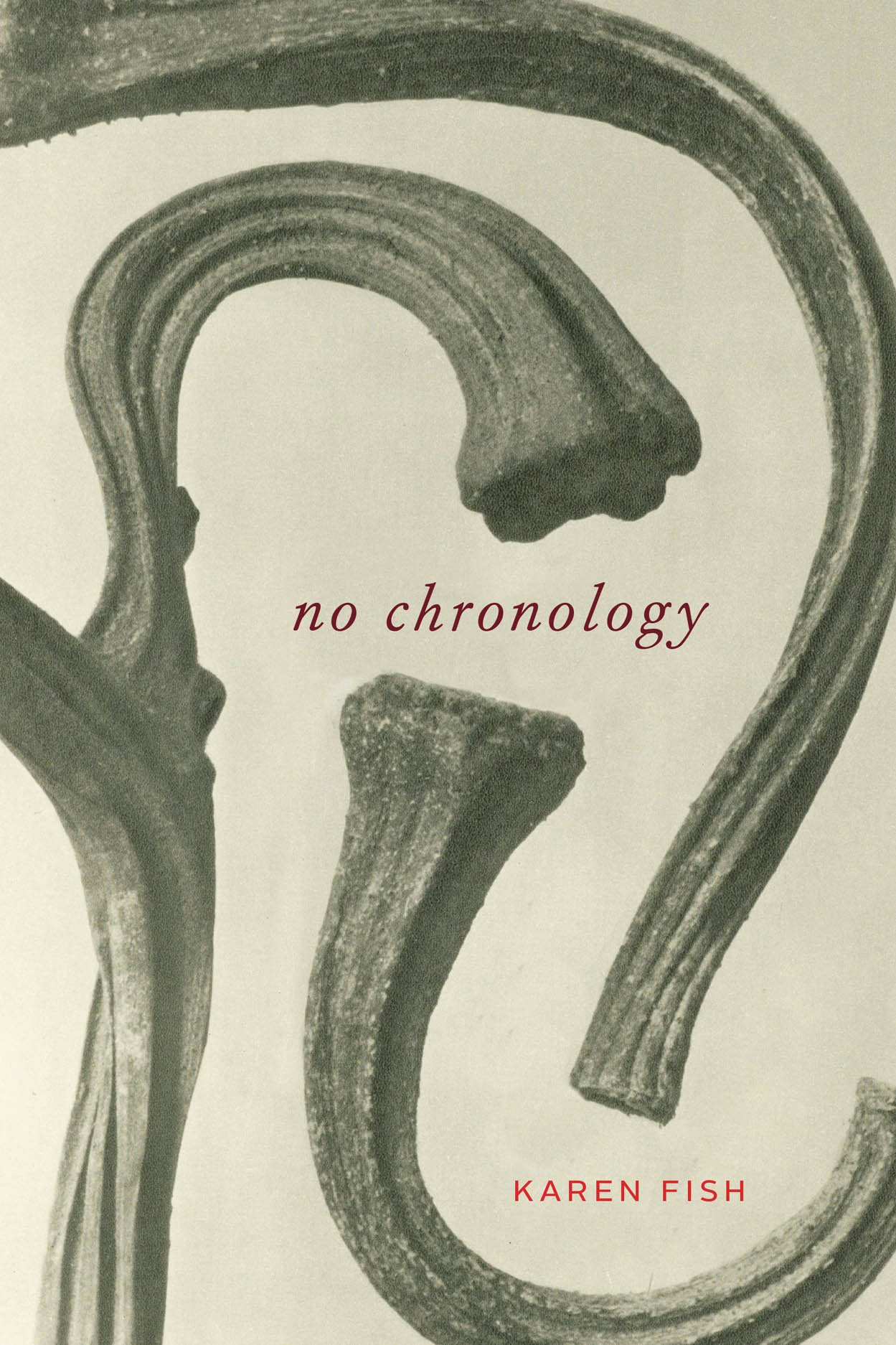Reviewed by Sarah D’Stair
Karen Fish's No Chronology plunges us deep within the tug-of-war between truth and memory. As the title suggests, the collection challenges the linearity we hold sacred, the chronologies that ground our lives and much of our art into episodic narratives. The poems capture, in short, the temporal muddle at the core of cognition. They lay bare distorted timelines and disrupt experiential cycles we rely on for self-definition.
The poems grant us glimpses into moments infused with both the profound and the mundane—the futility of a marriage counseling session; the puzzle of how a new piano will fit through a doorway; making love in the kitchen while the children are just outside to play. In "Black Bough," we are Ezra Pound's storied "petals," only instead of the subway platform, we stand in the "small square" of the executioner's platform, waiting for the moment when "the step is kicked away."
Fish reminisces about events that both have and have not happened to all of us, rendered metaphorical by the poet's pen, but true enough in real time. In "First Teacher," haunting in its spatial imagery, a little girl faces a massive cliff just before her, while a violent, swirling ocean rages at her back.
My beauty was in my sadness.
Sometimes, I think I was chosen simply because
of where I happened to be standing. A girl out in the open,
before rock cliffs not realizing everyone could tell, read
the abandonment clearly as a smile on my face.
This girl, paralyzed between two impossibilities, dwells in trauma, as we all do, conjuring a way to move forward despite the empty solitude of the task. Even in difficulty, the young speaker has the fortitude to see that "despite the odd adult humility, how I stood / had ambition." A "teacher" figure appears just at this moment of despair, ready to guide the girl through dignified paralysis, but is just as disillusioned as the pupil, who reminds us: "Disappointment is a rugged country."
Fish writes wonderfully detailed narrative poems, yet each detail is truncated, as if only a partial memory, again distorting chronological continuity. This technique can be seen especially in poems like "That Feeling," which inundate us with the "familiar."
So much of driving, unconscious really,
the familiar route past the cluster of houses—the empty churchand on past the nursery, spring shrubs and window boxes—
a parking lot so jammed with optimism they need a copy for the pull out.Of course, on the long trips, excursions, we've got both hands on the wheel—
GPS, satellite bounce back—all and all—it's living consciously—
doing one's best—feeling plugged in.
The life of these poems is in caesura, the blankness between impressions, the moment between moments. It's like living in between the flashes of blinkered lights, the fleeting sense of being without signal or rhythm or guide.
Early in the poem "Ars Poetica," we learn that the speaker's "mother drowned off the coast, the deep water too swift and cold." The young girl then must cope; she does so in language.
Past tense, present tense, first person narration,
third person omniscient . . .A story could be prompted by a stranger coming to town
or an unwanted relative appearing unannounced—
complication, crisis, climax, the consequences, then
denouncement—
which was resolution.And then I loved it—analogy, metaphor.
One could lie to tell the truth.
The poet's life is one of profound disassociation, for as linguists since de Saussure have taught us, the very nature of the word divorces us from the thing it is meant to represent. How much more so in poetic language, which draws us further into abstraction and metaphor? Fish seems to ask: how can a unitary consciousness exist, let alone thrive, amid so much prevarication? The poems, on the surface, celebrate the power of language to control reality; yet just beneath that veneer, there is deep ambivalence and hearty suspicion about the cognitive dissonance a life in letters brings. We fall as children into words and books, then become grownups who, with desperation, try to find the language of our child selves again—the language that saves, rather than drowns us.
One of my favorite poems in the collection is "The Greyhound" about an adopted former racing dog who is full of majesty and silent pride. The speaker seems almost jealous of the dog, who in his prime was worth four million dollars, and now frolics in the fields of a monastery, the whole world within his sight.
At the monastery, that dog could finally do the open hills.
Once, she chased a buck with a full rack till he turned
and thought, "who, who the hell?"
The dog was close enough to lick his haunch.
Often, she simply sat at the rise and scanning,
scanning the distance for the smallest movement,
her attention absolutely otherworldly.
The poet writes with quiet reverence for the dog's regulated precision, for his integration with his environment. There is an intense longing for that same kind of integrity of consciousness to be present in human experience, so that we, too, might know in the body what we see with the eye.
The poems in No Chronology are brutal wonders; they inspire and surprise; they render beautiful a world even at its most tragic. Indeed, poetry like this, which revels in the messiness of human truth, allows us to think that at the very least, as Fish writes, "Momentarily—one might believe that all this might just be survivable."

